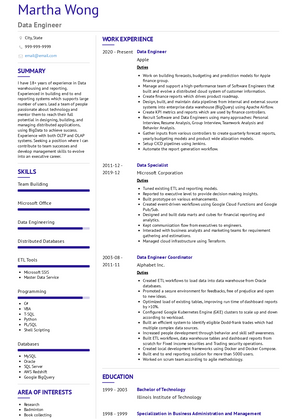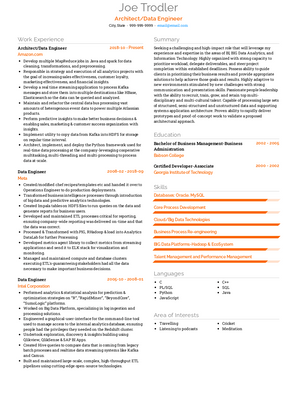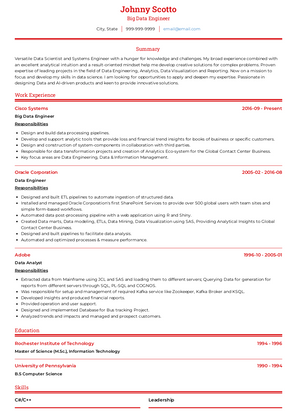3 Data Engineer Resume Examples
This page provides you with Data Engineer resume samples to use to create your own resume with our easy-to-use resume builder. Below you'll find our how-to section that will guide you through each section of a Data Engineer resume.



What Do Hiring Managers Look for in a Data Engineer Resume?
- Proficiency in data engineering tools and frameworks (e.g., Hadoop, Spark, Kafka).
- Strong programming skills in Python, Java, or Scala.
- Experience in building and maintaining ETL pipelines.
- Knowledge of database management systems like SQL, NoSQL, or PostgreSQL.
- Expertise in cloud platforms (e.g., AWS, Azure, GCP) and their data services.
- Evidence of optimizing data storage and ensuring scalability.
How to Write a Data Engineer Resume?
To write a professional Data Engineer resume, follow these steps:
- Select the right Data Engineer resume template.
- Write a professional summary that highlights your data engineering expertise, technical skills, and achievements.
- Include a section detailing your experience in designing and maintaining scalable data pipelines.
- Follow the STAR method to describe your work experience, focusing on how your engineering solutions added value.
- Highlight technical skills such as programming, data warehousing, and big data tools in a dedicated skills section.
- Include education, certifications, and training relevant to data engineering.
Advance your engineering career with a professionally crafted resume. Our engineering resume writing service showcases your technical expertise, project achievements, and problem-solving skills to help you secure top engineering roles.
How to Write Your Data Engineer Resume Header?
Write the perfect Data Engineer resume header by:
- Adding your full name prominently at the top.
- Including a professional photo if it aligns with industry norms in your region.
- Adding your current or most relevant data engineer role title.
- Providing contact information: city, phone number, professional email address, and a LinkedIn or GitHub profile link.
Bad Data Engineer Resume Example - Header Section
John Doe 123 BigData Lane Email: datamaster@email.com, Instagram: @datagenius123
Good Data Engineer Resume Example - Header Section
John Doe, Seattle, WA, Phone: +1-555-555-5555, Email: john.doe@email.com, LinkedIn: linkedin.com/in/johndoe, GitHub: github.com/johndoe
How to Write a Professional Data Engineer Resume Summary?
Use this template to craft a compelling Data Engineer resume summary: "Data Engineer with [number of years] years of experience in [specific areas, e.g., ETL development, big data processing]. Expert in [key skills, e.g., building scalable pipelines, data warehousing]. Proven success in [key achievement or project]."
Examples:
- "Data Engineer with 6+ years of experience in building and optimizing data pipelines. Skilled in Python, Spark, and AWS. Designed a scalable data warehouse that improved query performance by 40%."
- "Experienced Data Engineer with expertise in big data processing and real-time data streaming. Proficient in Kafka and Hadoop. Reduced ETL processing times by 25% through optimized workflows."
How to Write a Data Engineer Resume Experience Section?
Here’s how to structure an impactful Data Engineer resume experience section:
- Present work experience in reverse chronological order.
- Use bullet points for clarity, focusing on technical implementations and results.
- Quantify achievements wherever possible (e.g., reduced processing time by 30%, scaled systems to handle 1TB+ data daily).
- Emphasize expertise in tools, frameworks, and cloud platforms.
- Use action verbs such as "Built," "Optimized," "Developed," or "Streamlined."
Data Engineer Resume Example
Senior Data Engineer
- Built scalable data pipelines to process 2TB+ of data daily, reducing latency by 35%.
- Migrated on-premise data systems to AWS, cutting infrastructure costs by 20%.
- Designed and maintained a data warehouse to support business intelligence needs.
Data Engineer Resume Example
Data Engineer
- Developed ETL processes using Python and Spark to streamline data transformation.
- Implemented a Kafka-based streaming solution for real-time data ingestion.
- Automated monitoring systems to ensure 99.9% pipeline reliability.
Additional Sections for a Data Engineer Resume
- Certifications (e.g., AWS Certified Data Analytics, Google Cloud Data Engineer)
- Technical Projects (e.g., data pipeline optimization, cloud migration)
- Awards and Recognitions
- Languages (if applicable)
Top Data Engineer Resume Skills for 2025
- ETL Development
- Data Warehousing (e.g., Redshift, Snowflake)
- Big Data Tools (Hadoop, Spark)
- Cloud Platforms (AWS, Azure, GCP)
- Real-Time Data Streaming (Kafka, Flink)
- SQL and NoSQL Databases
- Python, Java, Scala
- Data Modeling and Architecture
- Performance Optimization
- Data Security and Compliance
How Long Should My Data Engineer Resume Be?
Data Engineer resumes typically range from one to two pages. Focus on technical expertise, certifications, and impactful projects to create a concise and effective document.
For assistance, consider using our resume builder or explore Data Engineer resume examples to get started.
Related Resumes
Something about this job catch your eye, but you aren’t quite sure if it’s a match? Check out these related resumes and discover where your next career move could take you.
- Data Analyst Resume Samples
- Developer Resume Samples
- Full Stack Developer Resume Samples
- Programmer Analyst Resume Samples
Certifications to Highlight in a Data Engineer Resume
Certifications demonstrate specialized skills and commitment to professional growth, making them a vital part of your resume.
- Key Certifications:
- AWS Certified Data Analytics – Specialty
- Google Professional Data Engineer
- Microsoft Certified: Azure Data Engineer Associate
- Cloudera Certified Data Engineer (CCDE)
- Databricks Certified Data Engineer Associate
Example Entry: “AWS Certified Data Analytics – Specialty: Demonstrated expertise in designing and implementing scalable data solutions on AWS.”
Professional Memberships for a Data Engineer Resume
Show your engagement with the data engineering community through professional memberships.
- Key Associations:
- Data Engineering Professionals Association (DEPA)
- Association for Computing Machinery (ACM)
- Cloud Native Computing Foundation (CNCF)
Example Entry: “Active member of the Data Engineering Professionals Association, participating in bi-monthly webinars on advanced data pipeline strategies.”
Achievements and Metrics in a Data Engineer Resume
Demonstrate the impact of your contributions by including quantifiable achievements.
- Examples:
- “Reduced ETL processing time by 40% through workflow automation using Apache Airflow.”
- “Built a scalable data warehouse in Snowflake, supporting analytics for 100+ users and reducing query latency by 30%.”
- “Optimized real-time data streaming pipeline with Kafka, handling 1M+ events per second.”
Career Progression for a Data Engineer Resume
Showcase how your role evolved over time, reflecting increasing responsibilities and achievements.
- Example Entry: “Data Engineer, XYZ Corp (20XX-Present): Promoted from Junior Data Engineer after successfully designing a data warehouse that improved report generation speed by 50%.”
Industry-Specific Experience in a Data Engineer Resume
Highlight experience in industries that align with the job you’re applying for, emphasizing specialized skills.
- Examples by Industry:
- Finance: “Developed data pipelines for fraud detection, reducing false positives by 20%.”
- Healthcare: “Streamlined ETL workflows for patient data, ensuring HIPAA compliance.”
- E-Commerce: “Designed a recommendation engine pipeline, increasing average order value by 15%.”
Technical Projects for a Data Engineer Resume
Projects provide tangible evidence of your technical skills and ability to deliver solutions.
- Examples:
- “Implemented a Kafka-based streaming pipeline for real-time stock price analysis, supporting up to 5M data points daily.”
- “Migrated on-premises data warehouses to Google BigQuery, cutting infrastructure costs by 25%.”
How to Showcase Cloud Expertise in a Data Engineer Resume
Cloud platforms are critical in modern data engineering. Highlight your experience with specific services.
- Examples:
- “Built scalable data pipelines using AWS Glue and Redshift to handle 3TB of data daily.”
- “Configured Azure Data Factory to automate ETL processes, reducing data lag by 50%.”
How to Highlight Data Pipeline Experience in a Data Engineer Resume
Your ability to design and maintain data pipelines is central to your role as a data engineer.
- Examples:
- “Designed ETL pipelines with Apache NiFi, processing 1TB+ data daily with 99.9% uptime.”
- “Optimized Spark jobs to reduce data processing time by 30% in a distributed environment.”
Education and Training for a Data Engineer Resume
Your educational background provides the foundation for your technical expertise.
- Key Details to Include:
- Degrees in Computer Science, Data Engineering, or a related field
- Specialized training in big data, cloud platforms, or database management
Example Entry: “Bachelor of Science in Computer Science, ABC University – Focused on distributed systems and data architecture.”
How to Highlight Data Security and Compliance in a Data Engineer Resume
Showcase your ability to ensure data security and regulatory compliance in your engineering solutions.
- Examples:
- “Implemented encryption and access control policies, ensuring GDPR compliance for 10M+ user records.”
- “Designed automated validation scripts to maintain data integrity across ETL pipelines.”
How can I highlight my experience as a Data Engineer on my resume?
Emphasize your expertise in designing and building scalable data pipelines, managing ETL processes, and ensuring data quality. Highlight your role in transforming raw data into usable formats, collaborating with cross-functional teams, and optimizing data workflows.
What are the key skills to feature on a Data Engineer's resume?
Focus on skills such as data architecture, ETL development, and database management. Detail your proficiency with programming languages like Python or SQL, your experience with big data tools like Hadoop or Spark, and your ability to work with cloud platforms like AWS or Azure.
How do I demonstrate my ability to build data pipelines on my resume?
Provide examples of data pipelines you have built or optimized, mentioning specific technologies and tools used. Highlight your role in automating data processing tasks and improving data accessibility for analysts and stakeholders.
Should I include metrics on my Data Engineer resume? If so, what kind?
Yes, include metrics such as reductions in data processing time, increases in data reliability, or improvements in data accessibility. These figures help quantify your contributions to data engineering projects.
How can I showcase my experience with cloud platforms on my resume?
Mention specific cloud services you have used, such as AWS Redshift, Azure Data Lake, or Google BigQuery. Describe how you’ve implemented cloud-based data solutions, ensuring scalability and cost-efficiency.
What kind of achievements should I highlight as a Data Engineer?
Highlight achievements like successfully migrating data warehouses to the cloud, improving ETL efficiency, or being recognized for innovative solutions in data processing. Include any initiatives that led to enhanced data quality or faster data processing times.
How do I address a lack of experience in a specific data engineering area on my resume?
Emphasize your core technical skills and highlight relevant projects, certifications, or coursework that demonstrate your ability to learn and adapt. Focus on skills that are transferable, such as data modeling or software development.
How important is collaboration for a Data Engineer role?
Collaboration is essential, as it involves working closely with data analysts, data scientists, and business stakeholders. Emphasize your experience in understanding business requirements, translating them into technical solutions, and supporting teams with clean and reliable data.
How do I demonstrate my ability to ensure data quality on my resume?
Mention your experience in implementing data validation techniques, setting up automated checks, and maintaining documentation for data processes. Highlight your attention to detail and commitment to delivering accurate and reliable data.
Should I include certifications on my Data Engineer resume?
Yes, certifications such as AWS Certified Data Analytics, Google Professional Data Engineer, or Microsoft Azure Data Engineer can strengthen your resume by showcasing your specialized knowledge and commitment to professional growth.
-
How to Highlight Data Pipeline Experience in a Data Engineer Resume
-
How to Highlight Data Security and Compliance in a Data Engineer Resume
-
How can I highlight my experience as a Data Engineer on my resume?
-
What are the key skills to feature on a Data Engineer's resume?
-
How do I demonstrate my ability to build data pipelines on my resume?
-
Should I include metrics on my Data Engineer resume? If so, what kind?
-
How can I showcase my experience with cloud platforms on my resume?
-
What kind of achievements should I highlight as a Data Engineer?
-
How do I address a lack of experience in a specific data engineering area on my resume?
-
How do I demonstrate my ability to ensure data quality on my resume?
Copyright ©2025 Workstory Inc.
